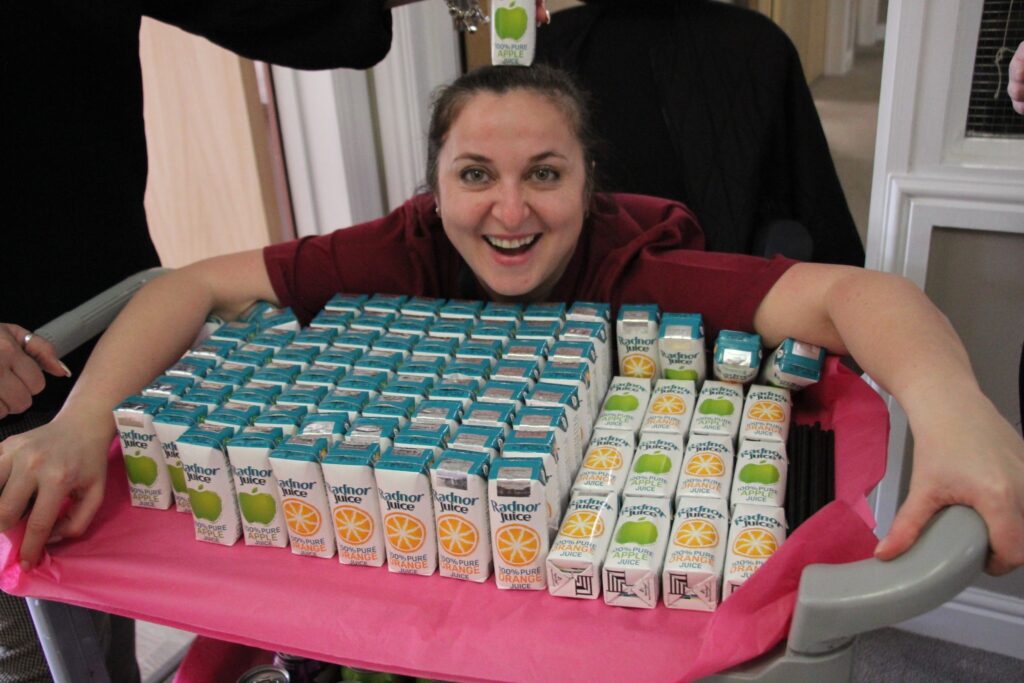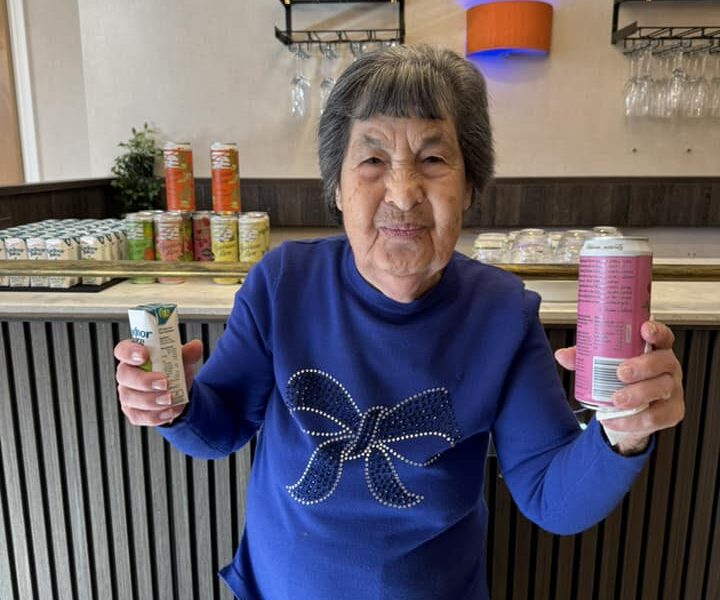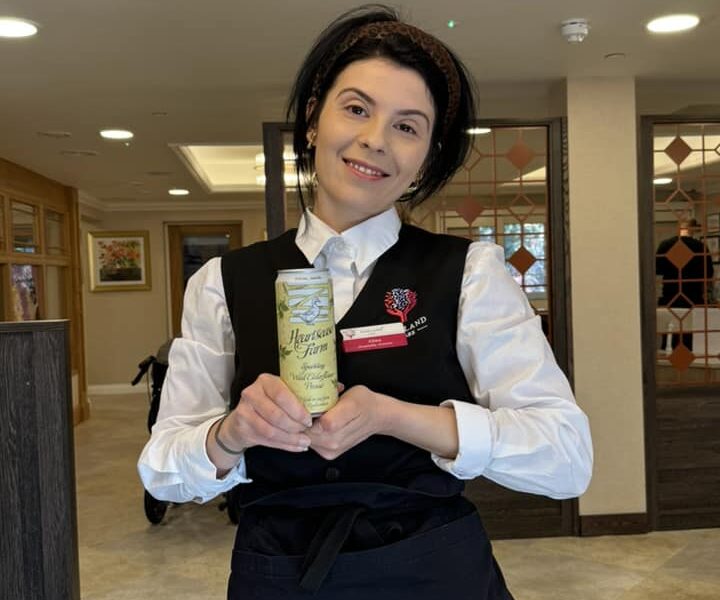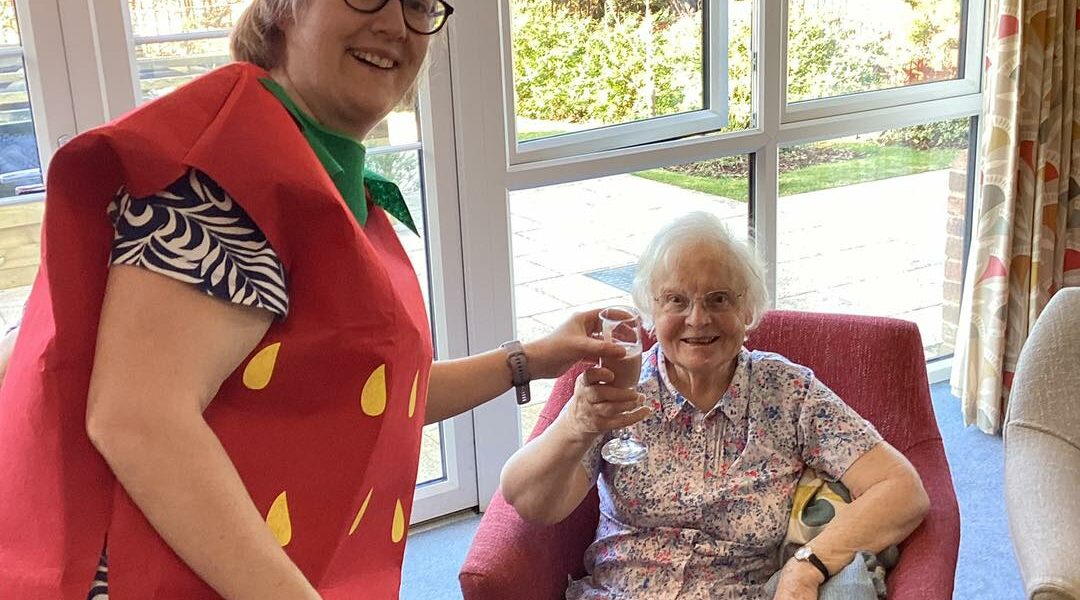
Effective hydration for elderly care
Dehydration can be hard to detect in older people so making sure they have enough to drink is crucially important.
Older people with age-related physical, cognitive and physiological conditions can also make them susceptible to low-intake dehydration.
In care homes, staff are encouraged to support residents to ensure that they drink enough throughout the day.
A lack of fluids can cause common complications such as dizziness which can lead to falls and fractures, constipation, pressure ulcers and urinary tract infections.
Some studies show that 1 in 4 older adults are dehydrated and often without realising they are.
The NHS recognizes dehydration as a significant health concern for older people, who are at a higher risk due to reduced thirst sensation and potential difficulties with mobility and communication.
Healthy hydration has been in the news recently thanks to a national awareness week, which the Radnor team has been involved with.
Nutrition and Hydration Week has been running for 13 years to educate people on the importance of maintaining a healthy fluid intake for older people in health and social care.
At Radnor we’ve been keeping our customers happily hydrated for 35 years this year with our range of exciting drinks, all made from the exceptionally pure spring water from boreholes on our farm land.
We teamed up with My Purchasing Partner to send boxes of Radnor drinks into all ten homes in the Oakland Care Group, an award-winning care home provider.
The homes, which are spread throughout the South and South East of England, all received samples of our Heartsease Farm Sparkling Premium Presses, made with 100% natural ingredients and no artificial sweeteners, and Tetra packs of our CQUIN and HFSS compliant Radnor Juice range, made with real fruit juice and with no added sugar.
What is CQUIN?
CQUIN (The Commission for Quality and Innovation) is a framework used by NHS England to encourage improvements in the quality of services for staff, patients and visitors across all healthcare settings. One of the CQUIN indicators focuses on healthy food and drinks. To meet this indicator, at least 80% of the drinks stocked must be ‘sugar-free’ or have less than 5 grams of sugar per 100ml.
HFSS explained
HFSS compliant means that a product is not classified as ‘high in fat, sugar or salt’. The government has introduced legislation to restrict the promotion of HFSS products. The Department of Health’s Nutrient Profiling Model is used to classify food and drink products as HFSS.
Radnor at Oakland Care
Lambwood Heights Care Home is an Oakland Care home based in Chigwell in Essex.
They were one of ten homes in the group to be sent a box of products by Radnor as part of Nutrition & Hydration Week. Staff offered our drinks to residents and they were also used as the base for a range of fresh fruit smoothies.
Lucy Malchar, Lifestyles Manager of Lambwood Heights, said: “We are always looking for fun and different ways to make hydration and nutrition more interesting. Our goal is to encourage individuals to increase their fluid intake in a way that feels natural and enjoyable, rather than forced.
“Using Radnor’s drinks in smoothies is a great way to help people be more hydrated. Additionally, blending various drinks and fresh fruit ingredients allows us to introduce essential nutrients that people may not normally be plateable to without being detected.
“For example, I wouldn’t usually be accustomed to eating spinach, but within a smoothie, the taste is unnoticeable. Our residents really enjoyed the smoothie-making class and trying new flavour combinations. It’s a win-win for both health and enjoyment.
“It’s also important for our staff to stay hydrated at work so they can do their jobs to the best of their ability.”
Annika James, Oakland Care’s Development Chef, said: “Hydration is a key factor in lowering ailments and issues in the body. De-hydrated people can suffer with constipation, falls, UTIs, low blood pressure, confusion and even pressure sores. This is why we promote healthy fluid intake for all our residents and staff.
“We use a variety of techniques to keep residents hydrated including plenty of fluids and water dense foods such as ice creams, jellies, soups and fruits.
“Some residents may be worried about drinking more due to their mobility or continence issues, whereas some residents may not realise that they need fluids for a number of reasons, so water dense foods are a good way to get extra hydration without raising anxiety over taking extra fluids.
“We also have hydration stations in the homes, which are visible and inviting, with squashes and fruit as well as water, with ice in drinks dispensers to keep them cold. There are always lots of glasses and adaptive items for those that need them. Pushing a hydration drinks round is also pivotal to ensure that our stations are utilised.”
Signs of dehydration
Older adults who are dehydrated can have symptoms which include: feeling thirsty, feeling lightheaded, tired, or confused, plus a dry mouth, lips, or tongue, and experience changes in their urination patterns.
Annika James adds: “Milder signs of dehydration can include tiredness, headaches, dry mouth and skin, bad breath, altered moods and sweet cravings.
“The more severe signs are the ones more likely to be spotted but could easily be misconstrued as something more serious. These include rapid breathing and heartbeat, low blood pressure, sunken eyes, severe dizziness or lightheadedness, dark coloured or no urine output, no skin elasticity and unconsciousness or delirium.”
Want to learn more about this topic?
These are good places for more information:
AGE UK, for hydration and nutrition resources as well as training materials and a leaflet on hydration.
Skills for Health, for the risk factors and signs of dehydration in care homes.
Health Innovation Wessex, for their Healthy Hydration for Older People toolkit.
-
The Pricing Digest: Fruit Juice (January 2025)
Welcome back to our quarterly roundup of the fruit
-
Flavour Predictions for 2025: What's Next in Food & Drink
At Radnor Hills, we’ve noticed a growing shi
-
FMCG specialist joins the Radnor Hills Board
Radnor Hills has welcomed FMCG specialist Jonathan
Join the Community


